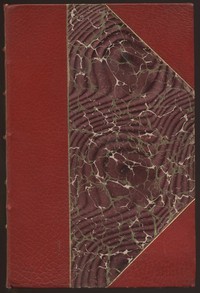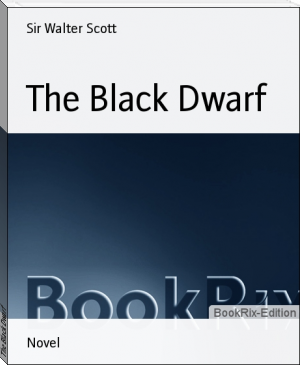Old Mortality, Volume 2. by Walter Scott (most important books to read txt) 📗

- Author: Walter Scott
Book online «Old Mortality, Volume 2. by Walter Scott (most important books to read txt) 📗». Author Walter Scott
The moonlight was giving way to the dawn when they approached that ancient fortress, and its dark massive tower had just received the first pale colouring of the morning. The party halted at the Tower barrier, not venturing to approach nearer for fear of the fire of the place. Lord Evandale alone rode up to the gate, followed at a distance by Jenny Dennison. As they approached the gate, there was heard to arise in the court-yard a tumult, which accorded ill with the quiet serenity of a summer dawn. Cries and oaths were heard, a pistol-shot or two were discharged, and every thing announced that the mutiny had broken out. At this crisis Lord Evandale arrived at the gate where Halliday was sentinel. On hearing Lord Evandale's voice, he instantly and gladly admitted him, and that nobleman arrived among the mutinous troopers like a man dropped from the clouds. They were in the act of putting their design into execution, of seizing the place into their own hands, and were about to disarm and overpower Major Bellenden and Harrison, and others of the Castle, who were offering the best resistance in their power.
The appearance of Lord Evandale changed the scene. He seized Inglis by the collar, and, upbraiding him with his villainy, ordered two of his comrades to seize and bind him, assuring the others, that their only chance of impunity consisted in instant submission. He then ordered the men into their ranks. They obeyed. He commanded them to ground their arms. They hesitated; but the instinct of discipline, joined to their persuasion that the authority of their officer, so boldly exerted, must be supported by some forces without the gate, induced them to submit.
"Take away those arms," said Lord Evandale to the people of the Castle; "they shall not be restored until these men know better the use for which they are intrusted with them.—And now," he continued, addressing the mutineers, "begone!—Make the best use of your time, and of a truce of three hours, which the enemy are contented to allow you. Take the road to Edinburgh, and meet me at the House-of-Muir. I need not bid you beware of committing violence by the way; you will not, in your present condition, provoke resentment for your own sakes. Let your punctuality show that you mean to atone for this morning's business."
The disarmed soldiers shrunk in silence from the presence of their officer, and, leaving the Castle, took the road to the place of rendezvous, making such haste as was inspired by the fear of meeting with some detached party of the insurgents, whom their present defenceless condition, and their former violence, might inspire with thoughts of revenge. Inglis, whom Evandale destined for punishment, remained in custody. Halliday was praised for his conduct, and assured of succeeding to the rank of the culprit. These arrangements being hastily made, Lord Evandale accosted the Major, before whose eyes the scene had seemed to pass like the change of a dream.
"My dear Major, we must give up the place."
"Is it even so?" said Major Bellenden. "I was in hopes you had brought reinforcements and supplies."
"Not a man—not a pound of meal," answered Lord Evandale.
"Yet I am blithe to see you," returned the honest Major; "we were informed yesterday that these psalm-singing rascals had a plot on your life, and I had mustered the scoundrelly dragoons ten minutes ago in order to beat up Burley's quarters and get you out of limbo, when the dog Inglis, instead of obeying me, broke out into open mutiny.—But what is to be done now?"
"I have, myself, no choice," said Lord Evandale; "I am a prisoner, released on parole, and bound for Edinburgh. You and the ladies must take the same route. I have, by the favour of a friend, a safe conduct and horses for you and your retinue—for God's sake make haste—you cannot propose to hold out with seven or eight men, and without provisions— Enough has been done for honour, and enough to render the defence of the highest consequence to government. More were needless, as well as desperate. The English troops are arrived at Edinburgh, and will speedily move upon Hamilton. The possession of Tillietudlem by the rebels will be but temporary."
"If you think so, my lord," said the veteran, with a reluctant sigh,—"I know you only advise what is honourable—if, then, you really think the case inevitable, I must submit; for the mutiny of these scoundrels would render it impossible to man the walls.—Gudyill, let the women call up their mistresses, and all be ready to march—But if I could believe that my remaining in these old walls, till I was starved to a mummy, could do the King's cause the least service, old Miles Bellenden would not leave them while there was a spark of life in his body!"
The ladies, already alarmed by the mutiny, now heard the determination of the Major, in which they readily acquiesced, though not without some groans and sighs on the part of Lady Margaret, which referred, as usual, to the /dejeune/; of his Most Sacred Majesty in the halls which were now to be abandoned to rebels. Hasty preparations were made for evacuating the Castle; and long ere the dawn was distinct enough for discovering objects with precision, the ladies, with Major Bellenden, Harrison, Gudyill, and the other domestics, were mounted on the led horses, and others which had been provided in the neighbourhood, and proceeded towards the north, still escorted by four of the insurgent horsemen. The rest of the party who had accompanied Lord Evandale from the hamlet, took possession of the deserted Castle, carefully forbearing all outrage or acts of plunder. And when the sun arose, the scarlet and blue colours of the Scottish Covenant floated from the Keep of Tillietudlem.
CHAPTER VIII. And, to my breast, a bodkin in her hand Were worth a thousand daggers. Marlow.
The cavalcade which left the Castle of Tillietudlem, halted for a few minutes at the small town of Bothwell, after passing the outposts of the insurgents, to take some slight refreshments which their attendants had provided, and which were really necessary to persons who had suffered considerably by want of proper nourishment. They then pressed forward upon the road towards Edinburgh, amid the lights of dawn which were now rising on the horizon. It might have been expected, during the course of the journey, that Lord Evandale would have been frequently by the side of Miss Edith Bellenden. Yet, after his first salutations had been exchanged, and every precaution solicitously adopted which could serve for her accommodation, he rode in the van of the party with Major Bellenden, and seemed to abandon the charge of immediate attendance upon his lovely niece to one of the insurgent cavaliers, whose dark military cloak, with the large flapped hat and feather, which drooped over his face, concealed at once his figure and his features. They rode side by side in silence for more than two miles, when the stranger addressed Miss Bellenden in a tremulous and suppressed voice.
"Miss Bellenden," he said, "must have friends wherever she is known; even among those whose conduct she now disapproves. Is there any thing that such can do to show their respect for her, and their regret for her sufferings?"
"Let them learn for their own sakes," replied Edith, "to venerate the laws, and to spare innocent blood. Let them return to their allegiance, and I can forgive them all that I have suffered, were it ten times more."
"You think it impossible, then," rejoined the cavalier, "for any one to serve in our ranks, having the weal of his country sincerely at heart, and conceiving himself in the discharge of a patriotic duty?"
"It might be imprudent, while so absolutely in your power," replied Miss Bellenden, "to answer that question."
"Not in the present instance, I plight you the word of a soldier," replied the horseman.
"I have been taught candour from my birth," said Edith; "and, if I am to speak at all, I must utter my real sentiments. God only can judge the heart—men must estimate intentions by actions. Treason, murder by the sword and by gibbet, the oppression of a private family such as ours, who were only in arms for the defence of the established government, and of our own property, are actions which must needs sully all that have accession to them, by whatever specious terms they may be gilded over."
"The guilt of civil war," rejoined the horseman—"the miseries which it brings in its





Comments (0)